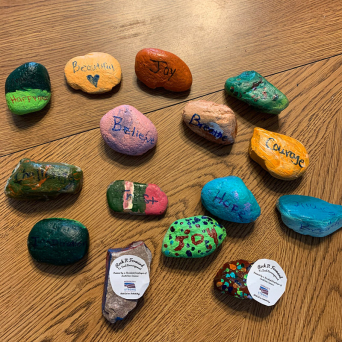A project that aimed to connect residents in 17 west-central Nebraska counties to crisis counseling services and other resources found that being out at public events that drew crowds sometimes missed those most in need.
“A lot of times, if someone is in need, depressed or fearing covid, they’re isolating,” said Michelle Kohmetscher, an outreach worker with the Nebraska Strong Recovery Project in Behavioral Health Region 2.
The Nebraska Strong project in 2020 received $6.7 million in new federal grants to focus on COVID-19.
The project, scheduled to continue through December, is a collaboration of the Nebraska Department of Health and Human Services, the University of Nebraska Public Policy Center, the Nebraska Emergency Management Agency and the state’s six behavioral health regions.
The project originally formed after the state’s 2019 flooding.
The pandemic turned out to be a disaster unlike any other, said Aaron Adams, network program specialist at DHHS’s division of behavioral health.
“Usually, a disaster affects very specific families or locations, but this was everyone, including the outreach workers themselves,” Adams said. “The scope was much broader than other situations.”
The project’s outreach workers, he said, “really rose to the challenge to find ways, whether virtually or in person, to support people.”
Nebraska Strong’s Region 2 team has done a good job of connecting with existing agencies and organizations, Adams said.
In her area of the state, Kohmetscher said, the outreach has involved networking to get out the word about available resources.
The Nebraska Strong project distributes a lot of printed materials, whether business cards, postcards, posters, flyers, brochures or children’s coloring pages. They advertise the Nebraska Family Helpline (1-888-866-8660) and the Rural Response Hotline (1-800-464-0258). Both statewide hotlines will continue to offer support to Nebraskans after the grant supporting the Nebraska Strong Recovery Project ends on December 26.
Kohmetscher, who lives near Blue Hill and also works as a massage therapist, said she has done a lot of traveling to offer training sessions on mental health first aid, recognizing trauma, the need for self-care and other topics. Her hope is when the project ends, many more people will be qualified to also train others.
The training sessions have been held at area hospitals, law enforcement agencies, public health offices, detention facilities, local colleges, a family planning clinic and daycare providers.
“We went into this with the idea of sustainability and getting the biggest bang for our buck,” Kohmetscher said. “We focused on agencies and organizations out there and providing training to them so they were better able to serve their clients.”
Adams said he was continually impressed by each regional team’s ability to be flexible and creative to adapt to the needs they saw.
COVID-19 is a polarizing topic, he said, and communities needed to be approached accordingly. Some businesses, for example. were more welcoming than others to masked outreach workers and materials about coping with the pandemic.
In many cases, outreach workers said, the common ground was a focus on stress and anxiety, whatever the source, and on paying attention to self-care and neighbors in need.
Kohmetscher said COVID-19’s impact for many has been indirect and mostly about restrictions they’ve faced as a result of the virus.
A recent case they encountered was particularly frustrating, she said, but typically she’s able to provide hope to people who are struggling, and she wants people to know Nebraska Strong is there to provide emotional and other support.
“We can’t do anything if we don’t talk about it.” Kohmetscher said. “Let us help do some problem solving.”
Author: Deb Shanahan

